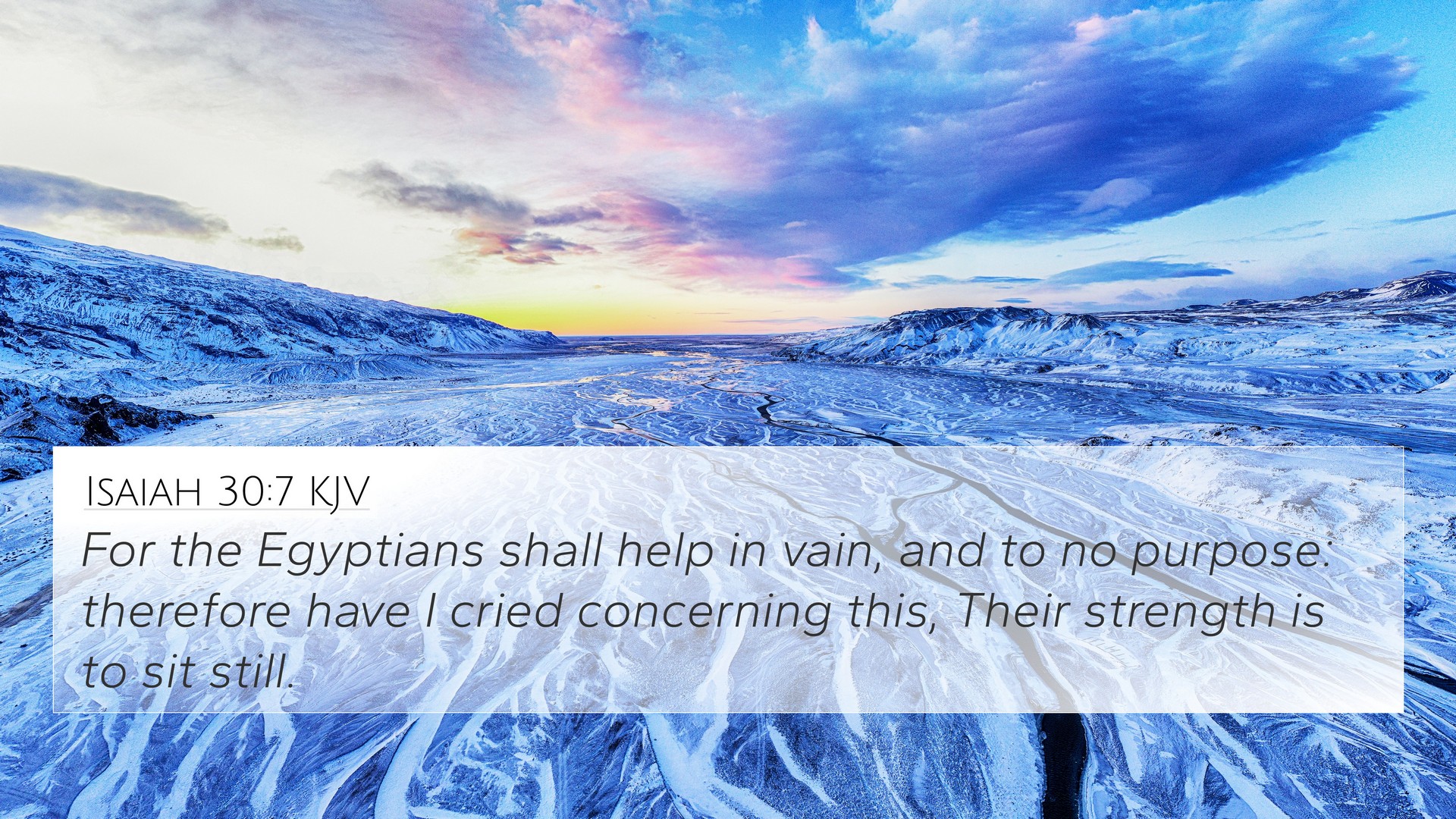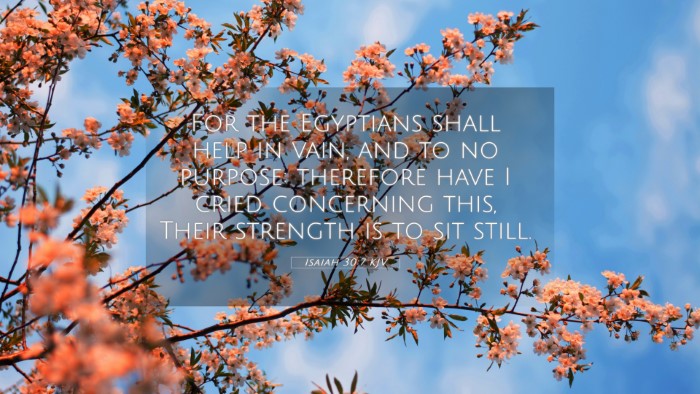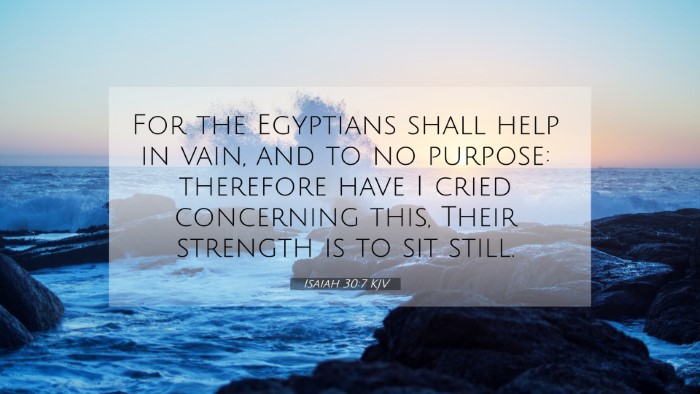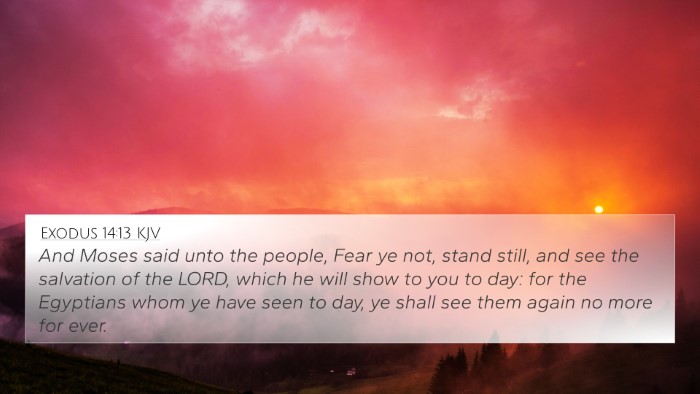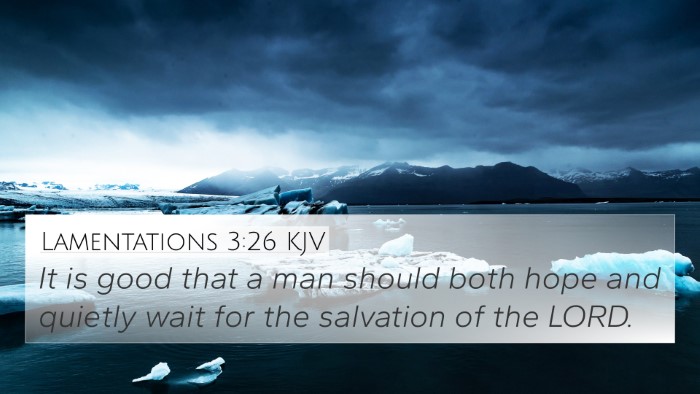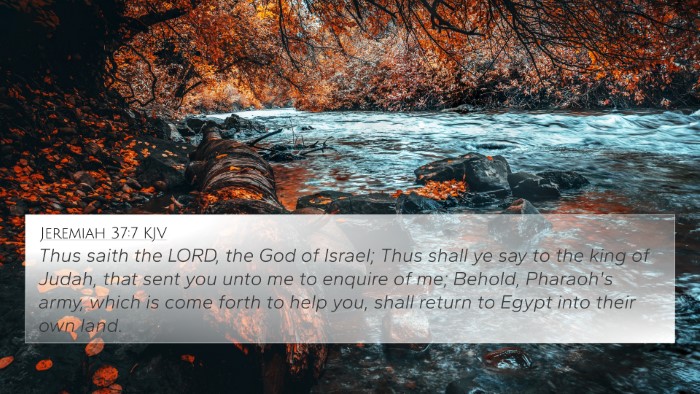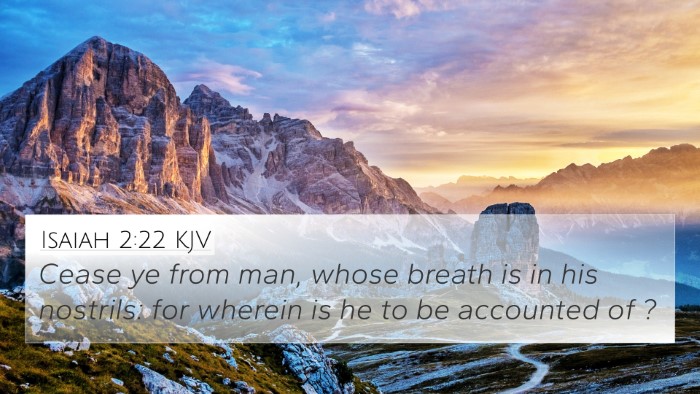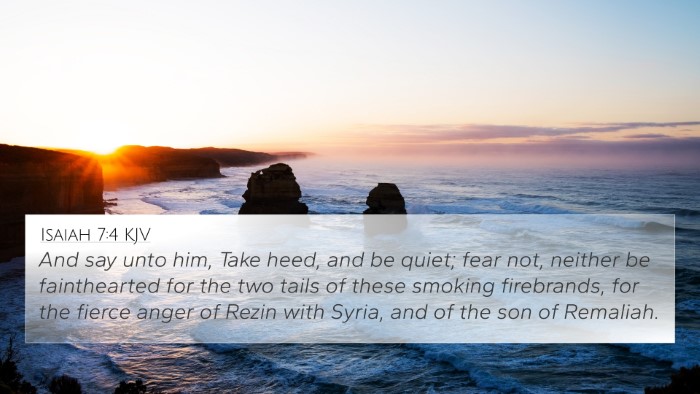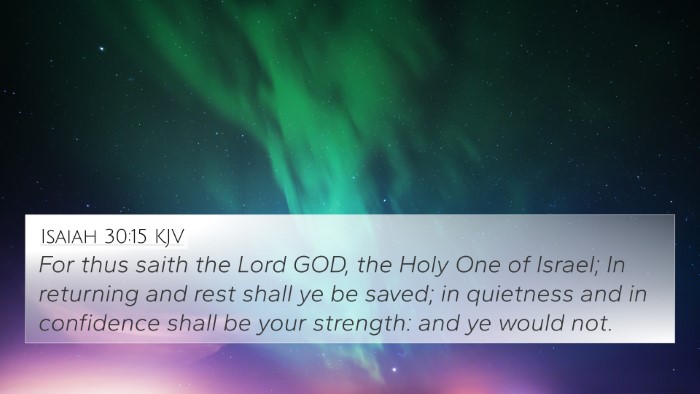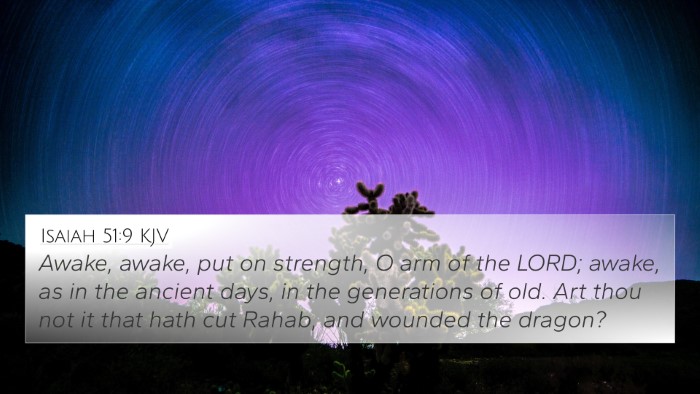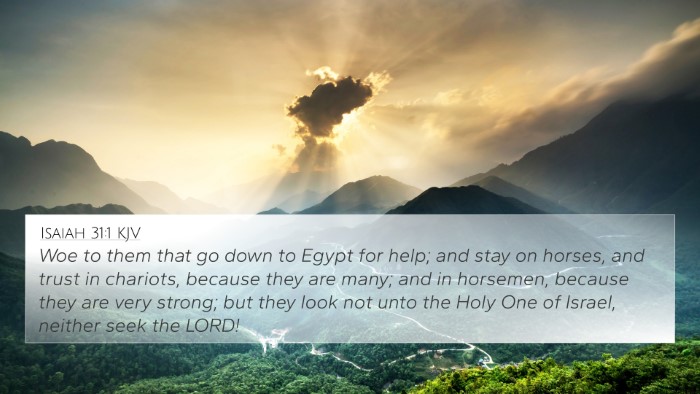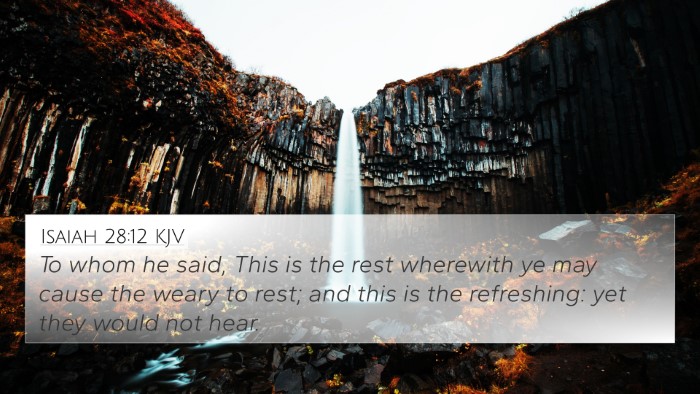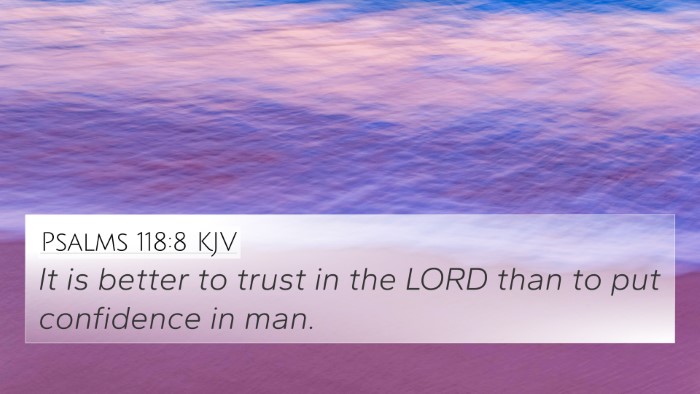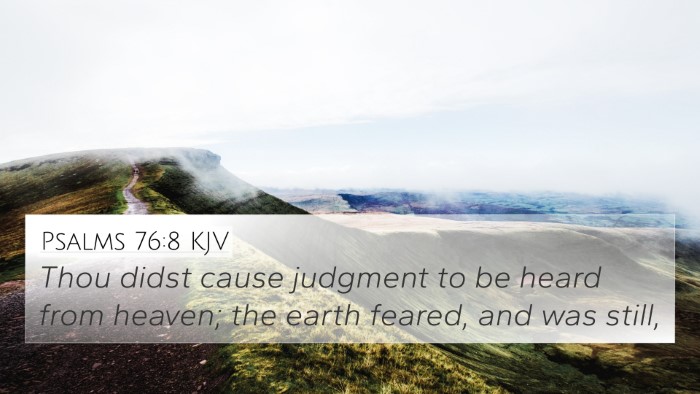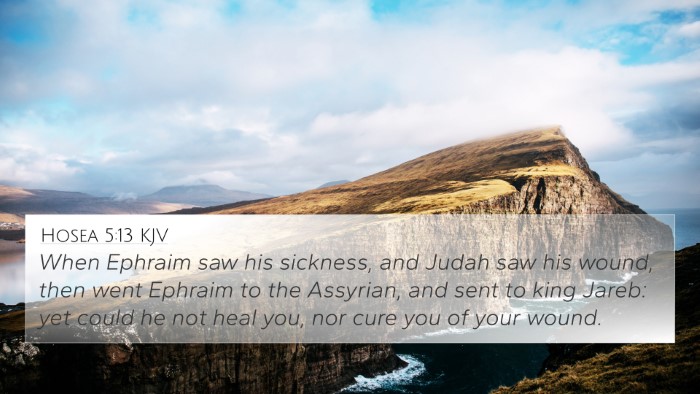Understanding Isaiah 30:7
Isaiah 30:7 states: “For Egypt’s help is worthless and empty; therefore I have called her, My Rahab who sits still.” This verse emphasizes the futility of relying on Egypt for assistance, highlighting the theme of misplaced trust. Below is a detailed interpretation of this verse drawn from public domain commentaries.
Summary of Isaiah 30:7 Meaning
This verse occurs in a context where the people of Judah are seeking help from Egypt instead of relying on God. The prophet Isaiah conveys God's disapproval of this alliance, illustrating that such worldly dependence is ultimately in vain.
Key Themes and Insights
- Misplaced Trust: Commentators such as Matthew Henry emphasize that turning to Egypt symbolizes a lack of faith in God’s power and protection.
- The Futility of Worldly Alliances: Albert Barnes discusses how alliances with pagan nations cannot provide true security or deliverance, thus underscoring the need for reliance on divine strength rather than human resources.
- Symbolism of Rahab: Adam Clarke draws attention to “Rahab,” a term which may refer to the mythological chaos monster. This signifies the total ineffectiveness of such alliances, as they are rooted in chaos and instability.
Cross-References and Connections
When exploring Isaiah 30:7, several cross-references enhance our understanding:
- Isaiah 31:1: “Woe to those who go down to Egypt for help.” This verse directly relates to the theme of seeking assistance from Egypt.
- Jeremiah 2:36: “Why do you go about so much to change your way? You shall be ashamed of Egypt as you were ashamed of Assyria.” This reflects the folly of relying on foreign powers.
- Psalms 147:10-11: “His delight is not in the strength of the horse, nor his pleasure in the legs of a man; but the Lord takes pleasure in those who fear Him.” This illustrates the value of trust in God over physical strength.
- 2 Kings 18:21: “But if you say to me, ‘We are trusting in the Lord our God,’ is it not he whose high places and altars Hezekiah has removed?” This underscores the danger of false security.
- Proverbs 21:30: “There is no wisdom, no insight, no plan that can succeed against the Lord.” This reinforces the notion that human plans are vain against divine will.
- Isaiah 36:6: “Behold, you are trusting in Egypt, that broken reed of a staff.” This metaphor indicates how unreliable such alliances are.
- Isaiah 20:5: “And the inhabitants of this coastland will say in that day, ‘Behold, this is what has happened to those in whom we hoped and to whom we fled for help.’”
Thematic Connections with Isaiah 30:7
In studying Isaiah 30:7, we also find thematic connections with broader biblical concepts:
- The Righteousness of God: The scripture reveals a clear distinction between reliance on God versus reliance on man.
- The Call to Repentance: This verse serves as part of a larger warning to turn away from false sources of strength.
- The Assurance of Divine Protection: Trusting in God brings true security, as evidenced in various psalms and prophetic writings throughout the Bible.
Comparative Bible Verse Analysis
To understand the implications of Isaiah 30:7 further, one can conduct a comparative Bible verse analysis with similar themes:
- Isaiah 12:2: “Behold, God is my salvation; I will trust, and will not be afraid.” This anticipates the comfort and assurance derived from trusting in God.
- Matthew 6:24: “No one can serve two masters.” This correlates with the decision-making struggle illustrated in Isaiah 30:7 concerning trust in God versus Egypt.
Applications for Today
The message of Isaiah 30:7 is particularly relevant for believers today:
- Trust in God Alone: This verse reminds the faithful of the importance of placing trust in God rather than worldly entities.
- Seek Divine Guidance: Just as the people of Judah were instructed, modern believers are encouraged to seek God’s direction in their decisions.
- Discernment in Relationships: The folly of aligning with untrustworthy alliances serves as a warning for contemporary relationships and partnerships.
Conclusion
Isaiah 30:7 is a profound reminder of the dangers of relying on human strength and the importance of seeking refuge in God. By examining cross-references, themes, and practical applications, we gain a richer understanding of these prophetic words. For further study, believers are encouraged to use tools for Bible cross-referencing, consult a Bible concordance, and explore comprehensive resources for a deeper knowledge of interconnected scriptures.
